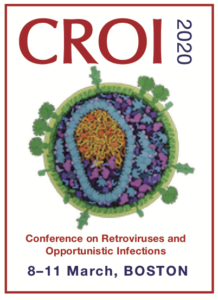Conference on Retroviruses and Opportunistic Infections (CROI 2020)
12 March 2020. Related: Conference reports, Conference index, CROI 27 (virtual) 2020.
 8 – 11 March 2020, Boston
8 – 11 March 2020, Boston
Simon Collins, HIV i-Base
This year, a last minute decision changed the CROI 2020 meeting from a physical to a virtual meeting.
Although the preceding week included several announcements that even with the concerns about COVID-19, CROI would proceed as normal, many delegates arrived in Boston for pre-meetings to find that the main meeting had been cancelled.
The final decision – clearly a difficult one – was only made on Friday 6th March. This was after three confirmed cases of COVID-19 earlier in the week in 150 participants at a medical meeting in Boston, that had strained the local medical system – and also based on 13 cases that had been confirmed in the state. A single diagnosis among thousands of delegates at CROI would have not been manageable.
However, even before the official decision from CROI, many participants, including European doctors, had already decided not to attend and some countries had prevented health workers from travelling (including Australia and Italy). These concerns were not from risk from COVID-19 itself, but from the implications of two weeks quarantine.
CROI are therefore to be congratulated on pulling a virtual conference together so quickly. Abstracts are already available on the CROI website and most posters should now be uploaded as PDF files. Nearly alll talks were streamed in real time, and oral presentations will be available as webcasts, perhaps the week after the conference.
www.croiconference.org
Webstreaming and post-presentation access (for delegates only)
https://croilive.capitalreach.com
If this virtual CROI is successful it might reduce the need for other international meetings in the future, perhaps still supported by reduced registration costs and better environmental outcomes from fewer flights.
The short term economic implications from coronavirus in general are likely to be more difficult if the decision made by CROI is taken by other conferences, concerts and sports events etc.
Even if things COVID-19 is resolved within a few months (UK predicts 50% of cases within three weeks and that 90% will have been seen within nine weeks, based on effective control measures) it will be difficult for airlines, hotels and supporting businesses given financial margins might already be slim.
The opening ceremony explained the reasons for making this year’s conference virtual. It highlighted the difficulties and challenges now faced to contain the coronavirus epidemic – including stigma, prejudice and misinformation – when the response should focus on the science, learning from the global response to HIV.
Also on a positive note, the expected highlights for CROI 2020 (and there will be many) include:
- At least 30 studies will be presented on new drugs for treatment and PrEP, including new classes (maturation and capsid inhibitors) and new long-acting formulations.
- Results about whether dosing for cabotegravir and rilpivirine long-acting injections can be every two months (rather than every month).
- First results about drug levels for a new drug for PrEP called islatravir, that might only need one pill, once a month.
- Updated results from using various bNAbs – immune-based treatments in early studies.
- Many studies looking at HIV cure, including tackling the HIV reservoir.
- An update on the London Patient who will have passed the two-year cautionary period suggested by researchers at CROI last year as being needed before this case could be called a cure.
- New results about options for treating HIV positive children.
- Basic science studies on the early stages of the HIV lifecycle.
- Additional analyses of side effects, including weight gain with some HIV drugs.
i-Base early reports will still be published during the conference week with links below.
- First results with long-acting capsid inhibitor GS-6207: oral and subcutaneous formulations for use in naïve and multidrug resistance
- CROI 2020: Special session on COVID-19
- Monthly islatravir for PEP and PrEP: 12 pills a year could cover unmet need for HIV prevention in billions of people globally
- London patient is second person to be cured of HIV from allogeneic stem-cell transplant
- Postpartum weight gain is higher with dolutegravir- compared with efavirenz-based ART among African women
- Safety and PK of bNAb elipovimab (GS-9722) support two-weekly dosing
- Long-acting cabotegravir and rilpivirine injections support two-monthly dosing
- The London Patient tells his story as second person cured of HIV
- i-Base publish HIV pipeline 2020: new drugs in development (March 2020)
- i-Base publish Fit For Purpose: antiretroviral treatment optimisation (March 2020)

